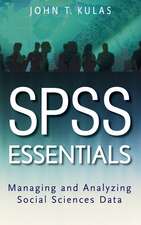Interactive Qualitative Analysis: A Systems Method for Qualitative Research
Autor Norvell Northcutt, Danny McCoyen Limba Engleză Paperback – 13 apr 2004
Aimed at helping students unscramble the mysteries of qualitative data collection, coding, and analysis, this book integrates and reconciles theory and methods by showing how to use a systematic, qualitative technique: interactive qualitative analysis.
| Toate formatele și edițiile | Preț | Express |
|---|---|---|
| Paperback (1) | 725.25 lei 43-57 zile | |
| SAGE Publications – 13 apr 2004 | 725.25 lei 43-57 zile | |
| Hardback (1) | 1056.85 lei 43-57 zile | |
| SAGE Publications – 19 apr 2004 | 1056.85 lei 43-57 zile |
Preț: 725.25 lei
Preț vechi: 993.49 lei
-27% Nou
Puncte Express: 1088
Preț estimativ în valută:
138.79€ • 144.08$ • 115.73£
138.79€ • 144.08$ • 115.73£
Carte tipărită la comandă
Livrare economică 24 martie-07 aprilie
Preluare comenzi: 021 569.72.76
Specificații
ISBN-13: 9780761928348
ISBN-10: 0761928340
Pagini: 472
Ilustrații: bibliog references, index
Dimensiuni: 178 x 254 x 26 mm
Greutate: 0.86 kg
Ediția:New.
Editura: SAGE Publications
Colecția Sage Publications, Inc
Locul publicării:Thousand Oaks, United States
ISBN-10: 0761928340
Pagini: 472
Ilustrații: bibliog references, index
Dimensiuni: 178 x 254 x 26 mm
Greutate: 0.86 kg
Ediția:New.
Editura: SAGE Publications
Colecția Sage Publications, Inc
Locul publicării:Thousand Oaks, United States
Recenzii
"The authors take a ‘user friendly’ systematic approach to qualitative research, something that has long been missing in the field. I consider this to be a groundbreaking work, one that will hit home with students and faculty alike."
“This book does an excellent job of integrating design, methods, and analysis. . . . The real beauty of the book is that it overturns many of the age-old assumptions about how ‘good’ research should be done. . . . The authors’ pleasant and refreshing style, coupled with subtle irreverence for outmoded or constraining paradigms of inquiry, makes for highly enjoyable reading.”
“This book does an excellent job of integrating design, methods, and analysis. . . . The real beauty of the book is that it overturns many of the age-old assumptions about how ‘good’ research should be done. . . . The authors’ pleasant and refreshing style, coupled with subtle irreverence for outmoded or constraining paradigms of inquiry, makes for highly enjoyable reading.”
Cuprins
Prologue: A True Story
Acknowledgments
1. Paradigm Wars: The Place of IQA
Particles and People : The Relationship of the Observer and the Observed
The Paradox of Representation
Paradigm Wars
A Framework for Discourse
More Than a Laundry List
Revisiting Kuhn
The Problem With Zealots
Discourse and Dialectics
Aristotelian Logic
Aquinas and the Scholastics
The Limitations of Logic
A Dialectical Alternative
The Ideology of IQA
Beliefs and Values Redux
Looking Back and Looking Forward
2. Systems as Representations
In for a Dime, In for a Dollar
Corvettes, Golden Means, and Fibonacci Numbers
Reification, Reality, and Social Construction
Understanding a System
Research Questions and Systems
What Is Research?
Systems Topology
Drivers and Outcomes
Topological Zones
Comparing the Two Models: Ritz Crackers and Coffee Cups
Epistemological Acrobatics: Zooming In, Zooming Out, and Looping
Making Sense of Systems: A Preview of Rationalization
Rigor and the Nature of Qualitative Research
IQA Systems
3. IQA Research Flow
Bricolage or Petit Point?
The Researcher's Footprint
Overview of the IQA Research Flow
Group Realities: IQA Focus Groups
IQA Interviews
IQA Results
4. IQA Research Design: Thinking About the Problem
Where Do I Start?
An Epistemological Dialectic
Synthesis, Not Compromise
Research Design as a System
Touring the System: An Example
Final Reflections
Case Example
5. Group Reality: System Elements
In Debt to TQM
Affinities: The Building Blocks of Mindmaps
Affinities and Variables: A Rough Analogy
The Power of Naming: Constructing Affinities
Designing the Focus Group
Focus Group Facilitation: Preparing to Conduct a Focus Group Exercise
Warm-Up Exercises: Some Variations
Architecture and Warm-Ups: The Same Principles Apply
Brainstorming the Rudiments of Meaning
Facilitator's Role and Functions
Clarification of Meaning
Affinity Analysis: The Logic of Inductive and Axial Coding
Back to the Focus Group
Inductive Coding
Axial Coding
Affinity Descriptions
Facilitation Guidelines: Flags for the Facilitator
Systems and IQA Focus Group Protocols
Case Example
6. Group Reality: System Relationships
Theory of Theoretical Coding
What Is Theoretical Coding?
Issue 1: Level of Detail
Issue 2: Organizing the Focus Group
Issue 3: Creating a Group Composite
Steps and Variations for Focus Group Theoretical Coding
Design Considerations
Focus Groups and Follow-Up Interviews
Focus Group-Only Research
Creating a Group Composite: The IRD
Determining Drivers and Outcomes
Focus Group System Influence Diagram
Protocol for Drawing the SID and Removing Redundant Links
Conclusion
Case Example
7. Individual Reality: The IQA Interview
The Role of Interviews
The Power of the Gods
Data, Analysis, and IQA
Structure and Purpose of the IQA Interview
Procedure for Creating an Interview Protocol
Preparing for the Interview
Logistical and Operational Details
Improvisation Within Structure
Some More Tips for Interviewing
Conclusion
Case Example
8. Individual Reality: System Relationships
Individual and Group Analytics
Individual Interview Coding
Combined Interview Coding
9. Description
IQA Theory and Presentation Format
The IQA Cookbook: A Detailed Outline for the "Typical IQA" Study
Affinities and Researcher Engagement
Turning the Write-Up Crank
Case Example: Research Purpose
Literature Review
Case Example: Literature Review
Methodology Documentation
Describing the Results
Case Example: Describing the Results
Describing Relationships
Case Example: Describing Relationships
Feedback Loops, Zooming, and Naming
Case Example: Feedback Loops, Zooming, and Naming
Turn the Crank Again
10. Interpretation
Representation and Interpretation
Interpreting the Results
Comparing Affinities
Case Example: Compairing Affinities
Comparing Composite Systems
Case Example: Comparing Composite Systems
Describing Individual Variations
Case Example: Describing Individual Variations
Applied Meaning: Forecasts and Interventions
Same Issue, Different Constituencies
Same Constituency, Different Issues: Metacomparisons
Looking Back and Looking to the End
11. Comparisons, Interpretations, and Theories: Some Examples
Overview
Case I. Power and Gender: Two Different Worlds
Case II. Body Image, Eating Disorders, and Media Messages
Case III. Principals' Supervision Styles in High- and Low-Performing Schools
Case IV. Education Entrepreneurs: Leaders and Followers
Case V. Rural Community Visioning
Case VI. The Graduate School Experience
Case VII. Text Analysis
Afterword
References
Index
About the Authors
Acknowledgments
1. Paradigm Wars: The Place of IQA
Particles and People : The Relationship of the Observer and the Observed
The Paradox of Representation
Paradigm Wars
A Framework for Discourse
More Than a Laundry List
Revisiting Kuhn
The Problem With Zealots
Discourse and Dialectics
Aristotelian Logic
Aquinas and the Scholastics
The Limitations of Logic
A Dialectical Alternative
The Ideology of IQA
Beliefs and Values Redux
Looking Back and Looking Forward
2. Systems as Representations
In for a Dime, In for a Dollar
Corvettes, Golden Means, and Fibonacci Numbers
Reification, Reality, and Social Construction
Understanding a System
Research Questions and Systems
What Is Research?
Systems Topology
Drivers and Outcomes
Topological Zones
Comparing the Two Models: Ritz Crackers and Coffee Cups
Epistemological Acrobatics: Zooming In, Zooming Out, and Looping
Making Sense of Systems: A Preview of Rationalization
Rigor and the Nature of Qualitative Research
IQA Systems
3. IQA Research Flow
Bricolage or Petit Point?
The Researcher's Footprint
Overview of the IQA Research Flow
Group Realities: IQA Focus Groups
IQA Interviews
IQA Results
4. IQA Research Design: Thinking About the Problem
Where Do I Start?
An Epistemological Dialectic
Synthesis, Not Compromise
Research Design as a System
Touring the System: An Example
Final Reflections
Case Example
5. Group Reality: System Elements
In Debt to TQM
Affinities: The Building Blocks of Mindmaps
Affinities and Variables: A Rough Analogy
The Power of Naming: Constructing Affinities
Designing the Focus Group
Focus Group Facilitation: Preparing to Conduct a Focus Group Exercise
Warm-Up Exercises: Some Variations
Architecture and Warm-Ups: The Same Principles Apply
Brainstorming the Rudiments of Meaning
Facilitator's Role and Functions
Clarification of Meaning
Affinity Analysis: The Logic of Inductive and Axial Coding
Back to the Focus Group
Inductive Coding
Axial Coding
Affinity Descriptions
Facilitation Guidelines: Flags for the Facilitator
Systems and IQA Focus Group Protocols
Case Example
6. Group Reality: System Relationships
Theory of Theoretical Coding
What Is Theoretical Coding?
Issue 1: Level of Detail
Issue 2: Organizing the Focus Group
Issue 3: Creating a Group Composite
Steps and Variations for Focus Group Theoretical Coding
Design Considerations
Focus Groups and Follow-Up Interviews
Focus Group-Only Research
Creating a Group Composite: The IRD
Determining Drivers and Outcomes
Focus Group System Influence Diagram
Protocol for Drawing the SID and Removing Redundant Links
Conclusion
Case Example
7. Individual Reality: The IQA Interview
The Role of Interviews
The Power of the Gods
Data, Analysis, and IQA
Structure and Purpose of the IQA Interview
Procedure for Creating an Interview Protocol
Preparing for the Interview
Logistical and Operational Details
Improvisation Within Structure
Some More Tips for Interviewing
Conclusion
Case Example
8. Individual Reality: System Relationships
Individual and Group Analytics
Individual Interview Coding
Combined Interview Coding
9. Description
IQA Theory and Presentation Format
The IQA Cookbook: A Detailed Outline for the "Typical IQA" Study
Affinities and Researcher Engagement
Turning the Write-Up Crank
Case Example: Research Purpose
Literature Review
Case Example: Literature Review
Methodology Documentation
Describing the Results
Case Example: Describing the Results
Describing Relationships
Case Example: Describing Relationships
Feedback Loops, Zooming, and Naming
Case Example: Feedback Loops, Zooming, and Naming
Turn the Crank Again
10. Interpretation
Representation and Interpretation
Interpreting the Results
Comparing Affinities
Case Example: Compairing Affinities
Comparing Composite Systems
Case Example: Comparing Composite Systems
Describing Individual Variations
Case Example: Describing Individual Variations
Applied Meaning: Forecasts and Interventions
Same Issue, Different Constituencies
Same Constituency, Different Issues: Metacomparisons
Looking Back and Looking to the End
11. Comparisons, Interpretations, and Theories: Some Examples
Overview
Case I. Power and Gender: Two Different Worlds
Case II. Body Image, Eating Disorders, and Media Messages
Case III. Principals' Supervision Styles in High- and Low-Performing Schools
Case IV. Education Entrepreneurs: Leaders and Followers
Case V. Rural Community Visioning
Case VI. The Graduate School Experience
Case VII. Text Analysis
Afterword
References
Index
About the Authors
Notă biografică
Dr. Northcutt teaches courses in quantitative and qualitative research methods and serves as research advisor on many CCLP dissertation committees. In addition, he serves as Technical Advisor to the Center for Community College Student Engagement (CCCSE) Project. After conducting a series of national research and development projects in adult functional literacy, for which he was the U.S. nominee for the UNESCO world literacy award, Northcutt was named Director of Research for the Southwest Educational Development Laboratory. He then went to Austin Community College, where he taught math statistics and computer science while serving as director of the college¿s administrative computing system and as Director of Analysis for ACC¿s Office of Institutional Effectiveness.
Descriere
Interactive Qualitative Analysis: A Systems Method for Qualitative Research aims to help students unscramble the mysteries of qualitative data collection, coding, and analysis by showing how to use a systematic, qualitative technique: interactive qualitative analysis. The authors synthesize ideas from grounded theory, path and factor analysis, quality management theory, Foucauldian concepts of power and knowledge, and systems theory. A dialectical revision of Guba and Lincoln's theory of rigor is offered which, combined with systems theory, offers new insights into the meaning of reliability and validity in qualitative research.










